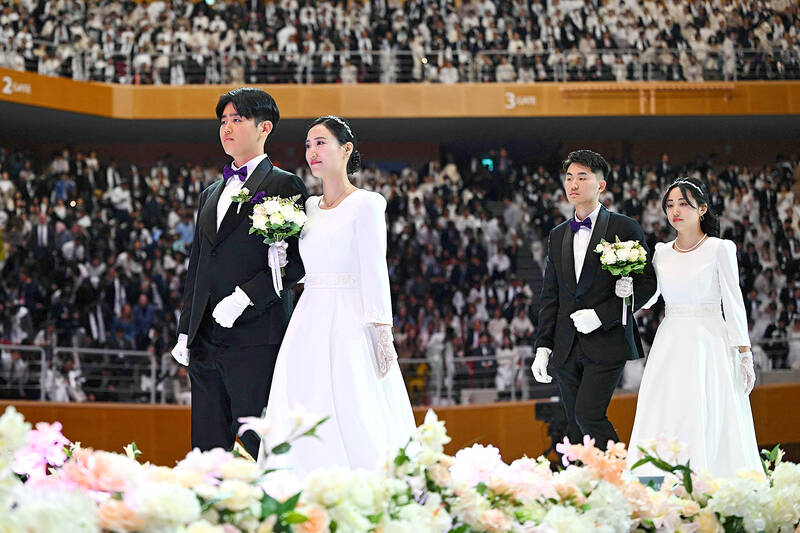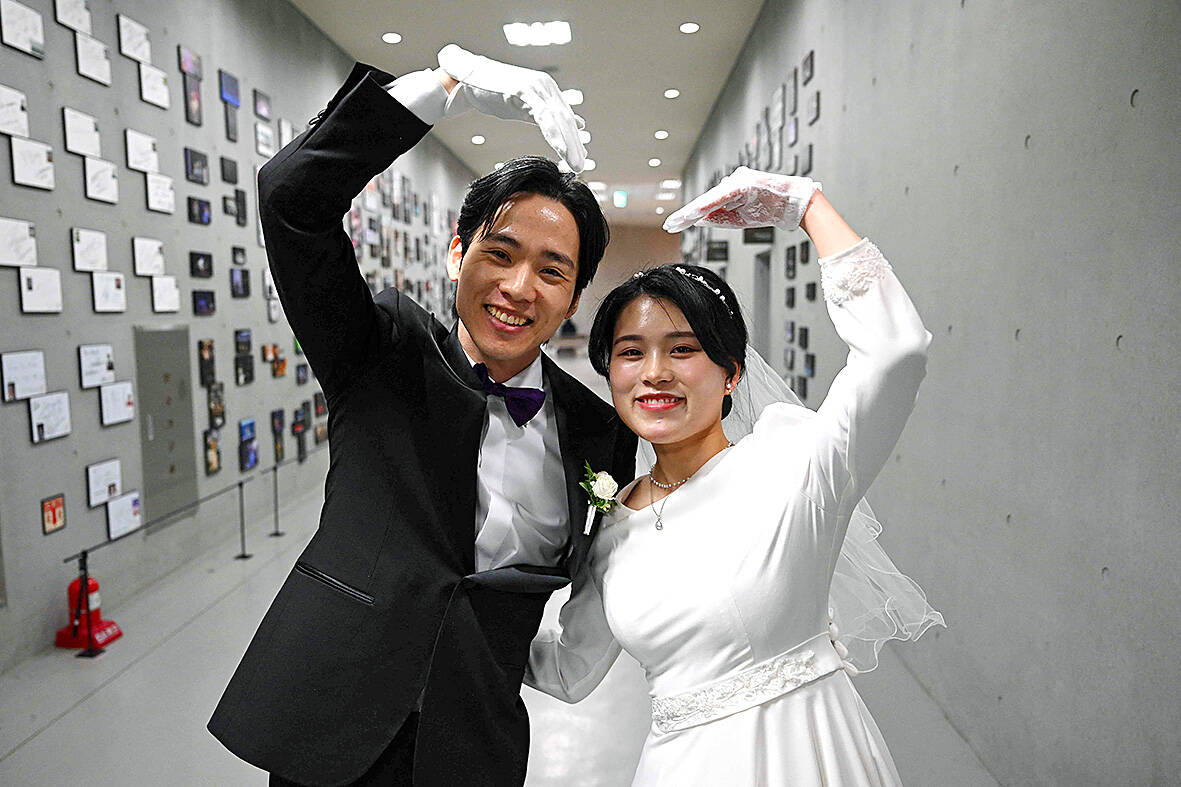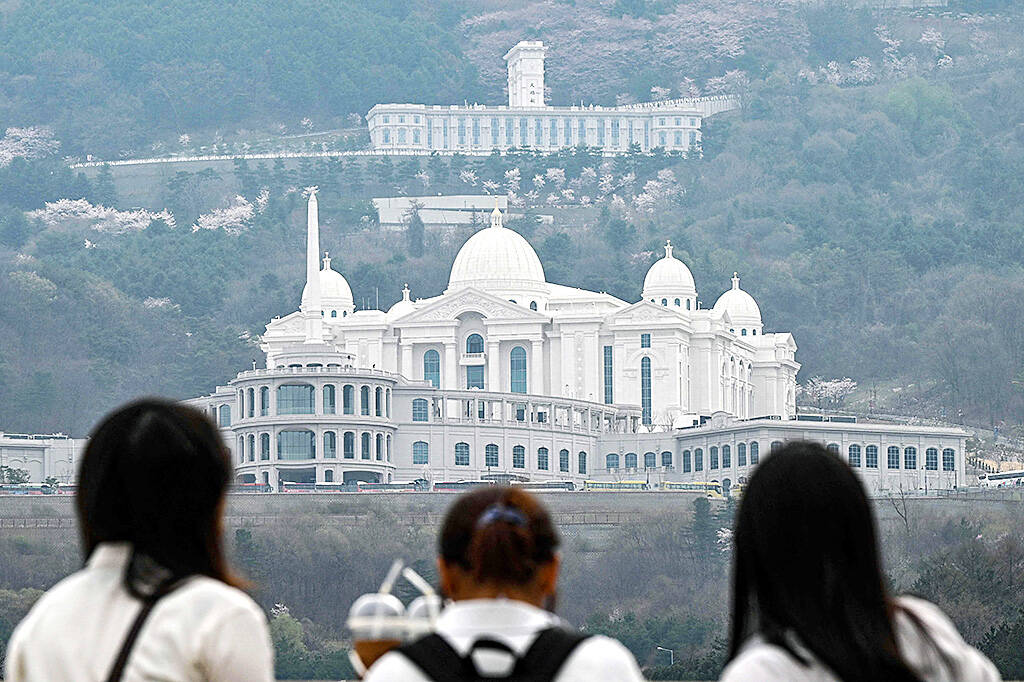They’ve been called a cult, accused of coercive fundraising, and legally disbanded in Japan. But in a mountainous town nestled in South Korea, thousands of “Moonies” gathered this month for a mass wedding.
Around 1,300 couples from dozens of countries tied the knot at the Unification Church’s sprawling headquarters in Gapyeong, north of Seoul, under the supervision of their controversial leader, known as the “holy mother.”
The spectacular tradition, which dates back to the first so-called “blessing ceremony” featuring 36 couples in 1961, is an integral part of the broadly neo-Christian beliefs held by the church, founded by Moon Sun-myung and now run by his widow, Han Hak-ja.

Photo: AFP
The church claims these mass weddings can help reverse South Korea’s woeful birthrate, improve family values, and ultimately bring about Moon’s goal of completing the unfulfilled mission of Jesus Christ to restore humanity to a state of “sinless” purity.
“I’m just really grateful,” American Emmanuel Muyongo, 29, said at the ceremony, where he married his Japanese wife, whom he met years ago and grew close to at a church in the US.
Muyongo’s own parents married at a mass wedding, and he said that he was honored “to experience what my parents’ experienced.”

Photo: AFP
“We love you, Holy Mother Han!” the couples shouted in unison at one point during the event, which featured blaring fanfare and confetti cannons.
Han, 82, looked almost eerily calm throughout the festivities, once slowly waving at her excited followers while wearing sunglasses and a green dress.
‘HOLY MOTHER’

Photo: AFP
The church, which was founded in 1954, claims to have around three million followers globally — including 300,000 in South Korea, 600,000 in Japan — and oversees a sprawling business empire encompassing construction, tourism, education and media, among others.
But in Japan, the church has been accused of coercive fundraising, especially after the 2022 assassination of former prime minister Shinzo Abe, allegedly carried out by a man who harbored resentment toward the sect. A court there revoked its legal status as an organization last month, although its members can continue to meet.
Abe’s accused killer blamed the church for his family’s financial ruin, after his mother made huge donations. Abe — along with other world leaders including US President Donald Trump — had sent video messages to events linked to the church.
But at the mass wedding this month, followers were unfazed by the recent legal blow, with the visibly emotional couples — including Japanese — radiating joy and gratitude to Han.
After Moon’s 2012 death, Han stepped up to lead the church and is now referred to by members as god’s “only begotten daughter” and the “holy mother.”
The church has links to everything from a major South Korean newspaper to a high-end ski resort used for the 2018 Pyeongchang Winter Olympics. It is also affiliated with esteemed art institutes.
In 1991, Han joined her late husband — revered by followers as a messiah but dismissed by critics as a charlatan — on his trip to North Korea to meet with its founder, Kim Il-sung, to discuss the reunification of the divided peninsula.
When her husband died, North Korea’s current leader Kim Jong-un sent a personal message of condolence. He later presented her with a pair of North Korean Pungsan dogs, a token of his goodwill.
This week, South Korean media alleged that the church had bribed former first lady Kim Keon-Hee — whose husband, Yoon Suk-Yeol, was recently ousted over his declaration of martial law — with a diamond necklace worth around US$41,970.
INDEMNITY
The church has appealed the Japanese court’s decision. Experts say that Japan, Korea’s former colonial ruler, has long been a financial hub for the sect.
“Usually, religious businesses like Unification Church target isolated lower-middle class individuals,” said Vladimir Tikhonov, Korean Studies professor at the University of Oslo.
“Their main ‘hunting ground’ is not South Korea, it is actually Japan,” he added.
Since the 1960s, the church is believed to have generated as much as 80 percent of its global revenues from Japan, according to Levi McLaughlin, a religious studies professor at North Carolina State University.
During Japan’s 1980s bubble economy, its branch reportedly sent up to 10 billion yen (US$70 million) per month to the South Korean headquarters.
Japanese followers are told to “atone” for the country’s colonial past, and McLaughlin said the mass weddings have been framed as a form of “indemnity.”
The church plays a role in match-making couples, experts say, with Japanese women often matched with non-Japanese men — and critics slam the cult-like cutting of family ties that sometimes results.
But this month in Gapyeong, more than 1,000 couples — each bride in near-identical white gowns and modest tiaras — wiped away tears, held hands tightly, and swayed to music as they danced and took selfies.
The couples “started from happiness and love, but it seems that those who don’t understand it well are misinterpreting it and only seeing the negative aspects,” said Remi Kosuga, 27, one of the brides.
“We simply want to believe in and learn about love. ... I hope people can see that.”

Taiwan has next to no political engagement in Myanmar, either with the ruling military junta nor the dozens of armed groups who’ve in the last five years taken over around two-thirds of the nation’s territory in a sprawling, patchwork civil war. But early last month, the leader of one relatively minor Burmese revolutionary faction, General Nerdah Bomya, who is also an alleged war criminal, made a low key visit to Taipei, where he met with a member of President William Lai’s (賴清德) staff, a retired Taiwanese military official and several academics. “I feel like Taiwan is a good example of

March 2 to March 8 Gunfire rang out along the shore of the frontline island of Lieyu (烈嶼) on a foggy afternoon on March 7, 1987. By the time it was over, about 20 unarmed Vietnamese refugees — men, women, elderly and children — were dead. They were hastily buried, followed by decades of silence. Months later, opposition politicians and journalists tried to uncover what had happened, but conflicting accounts only deepened the confusion. One version suggested that government troops had mistakenly killed their own operatives attempting to return home from Vietnam. The military maintained that the

Before the last section of the round-the-island railway was electrified, one old blue train still chugged back and forth between Pingtung County’s Fangliao (枋寮) and Taitung (台東) stations once a day. It was so slow, was so hot (it had no air conditioning) and covered such a short distance, that the low fare still failed to attract many riders. This relic of the past was finally retired when the South Link Line was fully electrified on Dec. 23, 2020. A wave of nostalgia surrounded the termination of the Ordinary Train service, as these train carriages had been in use for decades

Lori Sepich smoked for years and sometimes skipped taking her blood pressure medicine. But she never thought she’d have a heart attack. The possibility “just wasn’t registering with me,” said the 64-year-old from Memphis, Tennessee, who suffered two of them 13 years apart. She’s far from alone. More than 60 million women in the US live with cardiovascular disease, which includes heart disease as well as stroke, heart failure and atrial fibrillation. And despite the myth that heart attacks mostly strike men, women are vulnerable too. Overall in the US, 1 in 5 women dies of cardiovascular disease each year, 37,000 of them